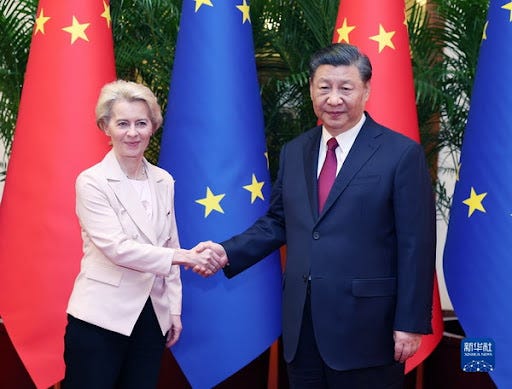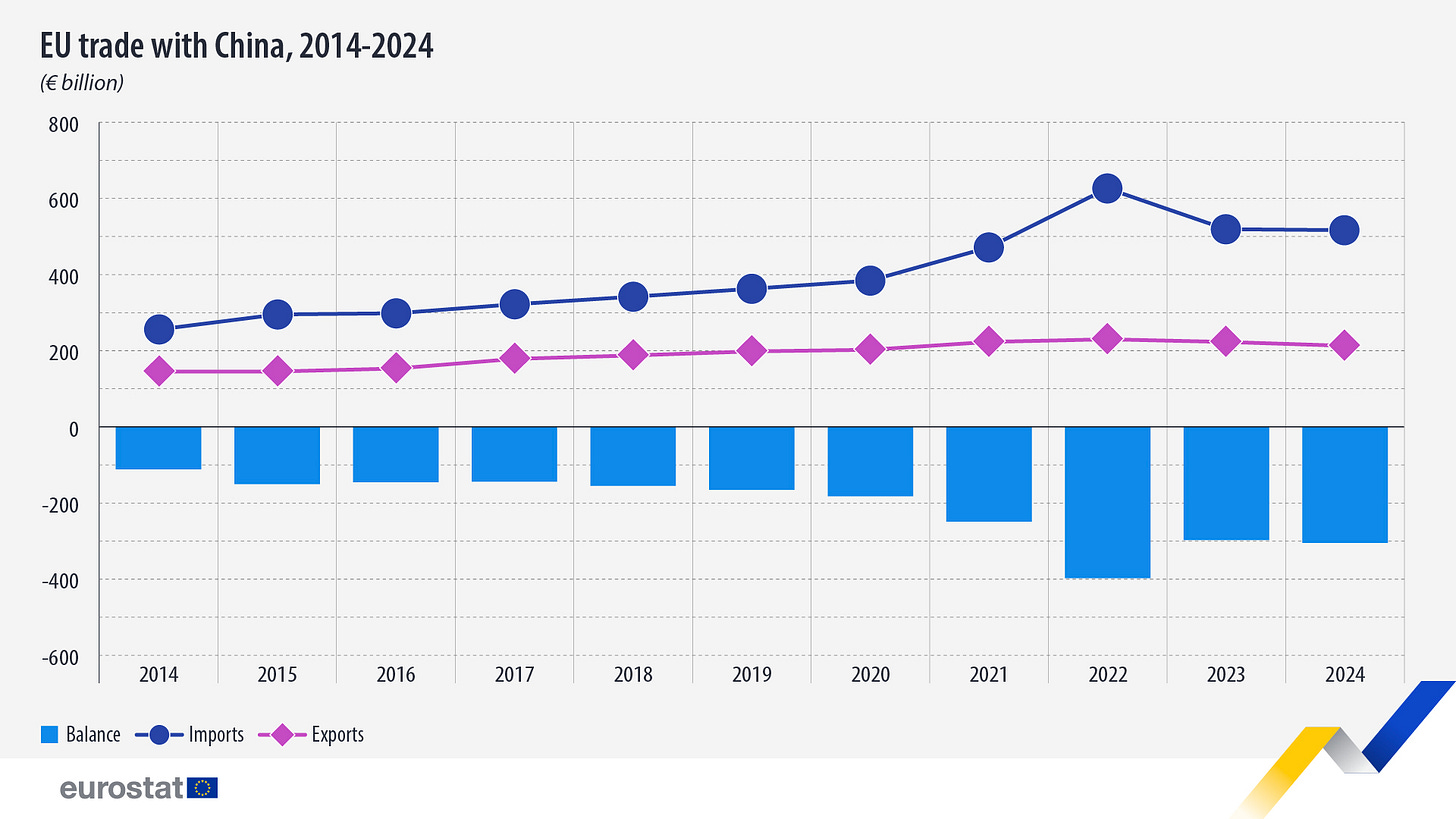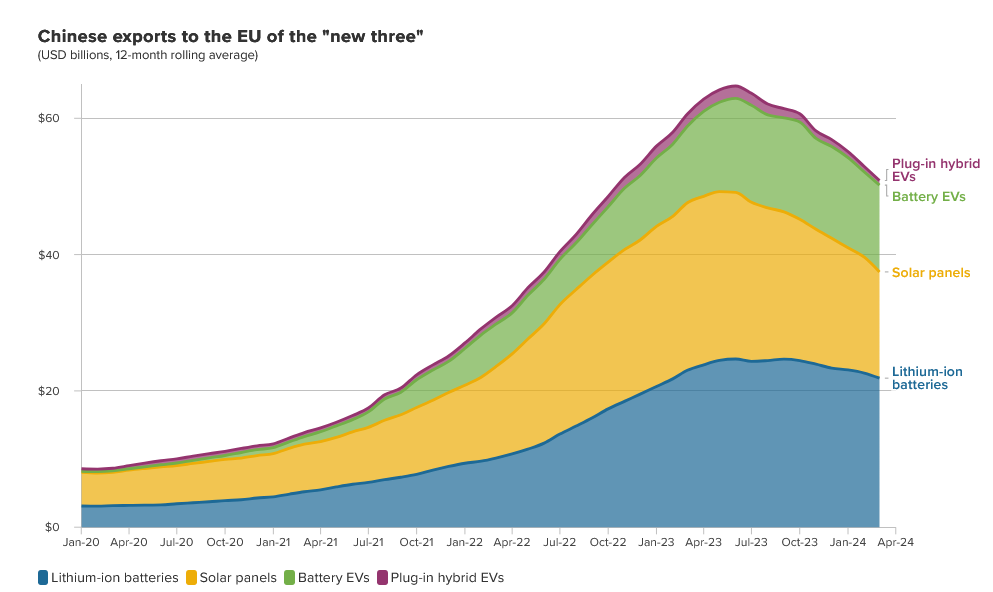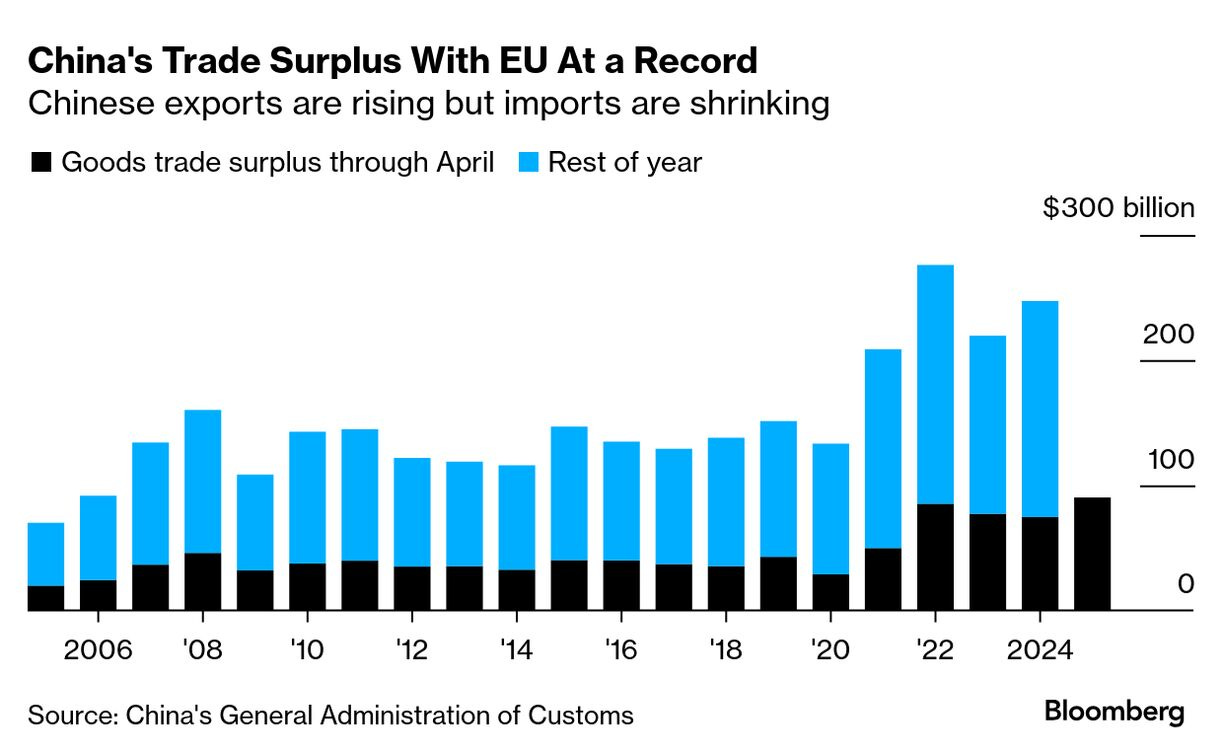Why Trump is not pushing Europe into China's arms
Or: how EU-China relations reached their lowest point
Is President Trump pushing the EU into China’s arms? That argument is increasingly told by media and think tanks.
Well, China would like that. It’s launched a charm offensive towards Europe calling for closer trade relations after Trump started his trade war. China’s message: let’s deepen trade now that Trump is sowing economic uncertainty. The partial lifting of sanctions on Members of the European Parliament is just the latest example of China’s PR campaign. Yet too many major economic and political obstacles still stand in the way of closer EU–China ties.
Biggest trade deficit in the world
China is already the EU’s second-largest trading partner, after the United States. Last year the EU exported €213 billion in goods to China but imported €518 billion, 21 percent of all its imports. It led to a €305 billion trade deficit in 2024, the largest worldwide.
Nevertheless, countries like Spain and Hungary, eager for Chinese investment, are hoping to further expand trade. Spain’s Prime Minister Sánchez even called China an “essential partner.” Chinese leader Xi Jinping used this rhetoric, especially after Trump raised import tariffs on Chinese goods to 145 percent.
But China still has a lot of goodwill to rebuild in Brussels. Relations plunged to a low last year over China’s unfair economic competition. The EU has long been worried by China’s refusal to play by the same rules, and it is increasingly taking action.
China plays a different economic game
The €305 billion deficit is largely driven by dumping. State-subsidised Chinese firms sell key products, like steel, batteries, and electric vehicles below market price. In this way “Made in China” has flooded the European market for years.
European manufacturers, for example of solar panels, simply cannot match the rock-bottom Chinese prices. The result: Chinese monopolies and European bankruptcies. In 2023, 98 percent of Europe’s imported solar panels came from China, as did 87 percent of its electric-vehicle batteries imports.
Even public procurement has been skewed. Last year, the state-backed Chinese automaker BYD, supported by at least €3.4 billion in subsidies, supplied 92 electric buses to the Flemish transit company De Lijn. They undercut competitors by 20 percent.
While China abuses Europe’s openness, it keeps foreign firms out. The EU ambassador in Beijing says China ignores European criticism and shows no sign of change. In fact, China isn’t merely breaking international trade rules, it’s playing an entirely different game. China’s calling for ‘free trade’ with Europe is as credible as Trump doing so.
That is why Brussels has responded with unprecedented measures against China’s unfair practices. The most famous are import duties of up to 45 percent on Chinese electric cars to counter subsidies. Chinese firms have also been forced out of several public tenders across Europe. And instructed by the European Commission, Dutch authorities raided the premises of the Chinese scanning firm Nuctech in Rotterdam. A state-owned company that “possibly’’ receives government support. The blinders are finally off in Europe.
Economy is security
At the same time, Europe increasingly realizes that economic dependence on China leaves it vulnerable. Whether in technology, clean energy, or critical raw materials. For some of them Europe relies for over 80% on China.
To reduce such dependencies, the EU has introduced economic-security and “de-risking” laws. Investigations into state subsidies and Chinese investments in sensitive sectors are part of this strategy. More trade with China would run counter to this approach, and any future talks will have these laws as guns on the table.
Finally, Trump’s tariffs may only worsen these structural problems. As the U.S. shuts its doors to “Made in China,” European Commission President Ursula von der Leyen warned a month ago that cheap Chinese goods could be rerouted to Europe.
Her warning came too late. In March, Chinese exports to the EU rose 10.3 percent year-on-year and climbed 8.3% in April, while exports to the U.S. fell 21 percent. Meanwhile China’s imports from the EU fell by 16.5% in April. The world’s largest trade deficit became even bigger with 15% over last year.
The Chinese Dragon and the Russian Bear
Beyond trade lie growing political tensions. China’s “no limits” partnership with Russia supports its war against Ukraine and helps it evade European sanctions. 80% of dual-use goods, used in both civilian and military applications, enter Russia from China. Without Chinese support, Russia could not wage its war at its current scale. Europe’s top diplomat, Kaja Kallas, even calls China the “key enabler” of the conflict, while Xi Jinping reiterated his support to Russia during a recent visit to Putin.
Add to this China’s aggression in the Taiwan Strait, human-rights abuses such as the repression of the Uighurs, and interference in Europe: cyberattacks on hospitals, defense agencies, politicians, illegal “police stations,” and intimidation of the Chinese diaspora.
Because of China’s aggressive posture, the EU has labeled China since 2019 as a strategic rival, an economic competitor, and a potential partner. Lovely partner, indeed. In recent years the emphasis has shifted toward rival and competitor. Even Germany’s new coalition, a government that always prioritised exporting Volkswagens, BMWs, and Bratwurst to China, now calls it a systemic rival.
Reality more complex than think-tank theory
In short, Europe will not simply be driven into China’s arms. Relations plummeted last year due to unfair competition and political tensions. Trump is only pushing Europe and China closer together in the world of think-tank theory. The cold economic and political reality is pushing them apart.







